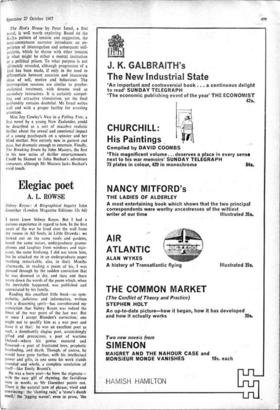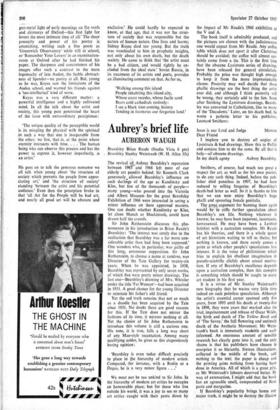Elegiac poet
A. L. ROWSE
Sidney Keyes: A Biographical Inquiry John Guenther (London Magazine Editions 12s 6d) I never knew Sidney Keyes. But I had a curious experience in regard to him. In the first years of the war he lived over the wall from my rooms in All Souls, in Little Drawda: we looked out on the same roofs and gardens, heard the same noises, undergraduate gramo- phones and laughter from windows and stair- cases, the same birdsong. I did not know him, but he attacked me in an undergraduate paper (nothing remarkable, alas, in that). Months afterwards, in reading a poem of his, I was pierced through by the sudden conviction that he was doomed to die, and then and there wrote down the words of the poem which, when the inevitable happened, was published and appreciated by his family.
Reading this excellent little book—so sym- pathetic, judicious and informative, written with a discerning spirit—has corroborated my conviction that Sidney Keyes was indeed the finest of the war poets of the last war. But at once I accept Blunden's correction; one ought not to qualify him as a war poet and leave it at that: he was an excellent poet as such, a domitlantly elegiac poet, astonishingly gifted and precocious, a poet of wartime Oxford—where his genius matured and flowered—a poet of frustrated love, prophetic foreboding, and death. Though, of course, he would have gone further, with his intellectual Power and gifts, in one sense his work stands rounded and whole, a complete revelation of itself—like Emily Bronte's.
.He was a born poet—he bore the stigmata— with the easy gift of rhyming, the fastidious taste in words, as Mr Guenther points out. There is the natural turn of phrase, vivid and convincing: the 'slanting rain,' a `stone's dumb Smell,' the 'jigging waves'; even in prose, 'the gun-metal light of early mornings on the roofs and chimneys of Oxford—this first light for lovers the most intimate time of all.' The sheer precocity and power of his poetry is astonishing, writing such a fine poem as 'Greenwich Observatory' while still at school, or 'Remember Your Lovers' in an examination- room at Oxford after he had finished his paper. The sharpness and concreteness of his images offer such a contrast to the mere logomachy of late Auden, the feeble abstract- ness of Spender—no poetry at all. But, young as he was, Keyes saw the limitations of the Auden school, and warned his friends against a 'too-intellectual' kind of verse.
Keyes was a very different matter: a powerful intelligence and a highly cultivated mind. In all the talk about the artist and society, this young poet penetrated the heart of the issue with extraordinary percipience: 'The unique quality of the perceptible world is its mingling the physical with the spiritual in such a way that one is inseparable from the other; we live, that-is, at the point where eternity intersects with time. . . . The human being who can observe this process and has the power to express it, however imperfectly, is an artist.'
He goes on to talk the generous nonsense we all talk when young about 'the structure of society which prevents the people from appre- ciating art,' and 'the structure of society' standing 'between the artist and his potential audience.' Even then the perception broke in that 'all Art for the -People will be bad art, and nearly all good art will be obscure and exclusive.' He could hardly be expected to know, at that age, that it was not the struc- ture of society that was responsible but the nature of human nature. One lives and learns; Sidney Keyes died too young. But the truth was vouchsafed to him in prophetic insights, not only about his own death, but the death society. He came to think that 'the artist must be a bad citizen, and would rightly be ex- cluded from the ideal state.' Soviet Russia, in its treatment of its artists and poets, provides an illuminating comment on that. As for us, 'Walking among this island People inhabiting this island city, Whose coast recedes, whose facile sand Bears cold cathedrals restively: I see a black time coming, history Tending in footnotes our forgotten land.'











































 Previous page
Previous page